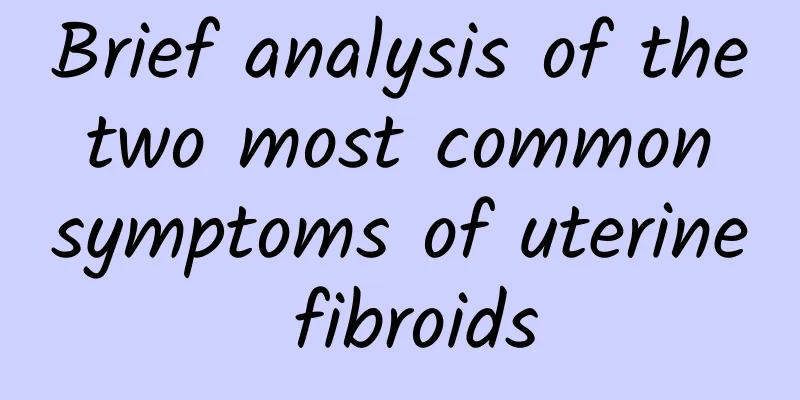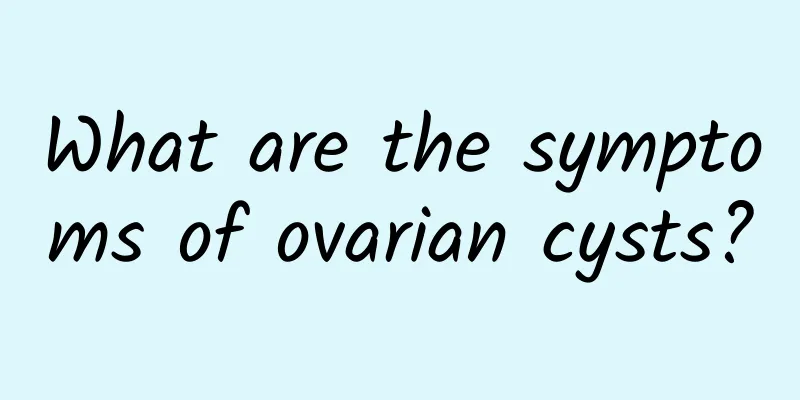Brief analysis of the two most common symptoms of uterine fibroids

|
Among the various symptoms of uterine fibroids, two are the most common. Most female friends seek medical treatment because of these two symptoms of uterine fibroids. It is very important to diagnose uterine fibroids. What are the common symptoms of uterine fibroids ? Let's talk about the common symptoms of uterine fibroids. In general, common symptoms of uterine fibroids include: 1. Abdominal mass. This is a common symptom of uterine fibroids. When the subserosal or intramural fibroids grow beyond the pelvic cavity, most patients can feel the mass and go to the hospital for treatment, which may be accompanied by a feeling of falling. Fibroids located in the lower part of the uterine body and cervix, if incarcerated in the pelvic cavity, can compress the pelvic tissues and nerves, causing lower abdominal pain and back pain. Fibroids grow forward or backward, which can compress the bladder, urethra or rectum, causing frequent urination, dysuria, urinary retention or constipation. When fibroids grow to both sides, broad ligament fibroids are formed. When they compress the ureter, they can cause hydroureteral or renal pelvis; if they compress the pelvic blood vessels and lymphatic vessels, they can cause lower limb edema. 2. Pain and abnormal menstruation. Uterine fibroids can cause pain, but the pain is not obvious in some patients. In addition to the pain caused by compression of the pelvic nerves, the symptoms of uterine fibroids include pain caused by uterine contractions caused by pedunculated submucosal fibroids in the uterine cavity. When the fibroids block the cervical canal and prevent menstrual blood from flowing out, the symptoms of uterine fibroids can cause dysmenorrhea. When the pedicles of pedunculated subserosal fibroids are twisted or when the uterine fibroids undergo red degeneration or infection during pregnancy, they can cause more severe abdominal pain. Increased menstruation often occurs in submucosal and intramural fibroids, manifested as menorrhagia, prolonged menstruation or irregular vaginal bleeding. The main reasons for increased bleeding are: the area of the endometrium increases, the estrogen acts on the endometrium to proliferate, the fibroids hinder the contraction of the uterus, and affect the blood circulation to cause endometrial congestion. Due to long-term bleeding, patients often have varying degrees of anemia. These are all common symptoms of uterine fibroids. The above is a brief analysis of the common symptoms of uterine fibroids, I hope it will be helpful to everyone. Once the above symptoms of uterine fibroids appear, you must go to the hospital for treatment in time to avoid missing the best treatment time and seriously delaying the disease. |
<<: Briefly tell you about the common symptoms of cervical hypertrophy
>>: Introduction to the three main types of people who are susceptible to uterine fibroids
Recommend
Do you know what are the symptoms of malignant ovarian cysts?
Ovarian cysts are generally benign, but the sympt...
How to check for intrauterine adhesions
How to check for intrauterine adhesions? Intraute...
Treatment of vulvar leukoplakia
Many people are unfamiliar with vulvar leukoplaki...
Common Misunderstandings in Diagnosis of Cervical Precancerous Lesions
The diagnosis method of cervical precancerous les...
How much does it cost to treat cervical erosion?
The cost of treating cervical erosion is the firs...
How harmful is vulvar leukoplakia?
What are the hazards of vulvar leukoplakia? Since...
What are the ways to prevent spontaneous abortion? Do these 4 things
The occurrence of spontaneous abortion is a great...
What are the treatments for central amenorrhea?
Treatments for central amenorrhea include medicat...
It’s so hot in summer and you want to eat ice? Super cute fruit popsicles to cool down without making you fat!
Every summer, I believe many people will lose the...
Is bilateral polycystic ovary serious?
Polycystic changes on both sides of the ovaries a...
What are the early symptoms of ovarian cysts?
Patients with ovarian cysts should all know that ...
Does progesterone capsules induce menstruation? Treating irregular menstruation
Progesterone capsules are an oral progestogen dru...
What foods should not be eaten when suffering from bacterial vaginosis
Bacterial vaginosis is very familiar to every adu...
Some early symptoms of female adnexitis
Adnexitis is a common disease among women, which ...
What hemostatic medicine should I take for prolonged menstrual bleeding?
What hemostatic medicine should I take for prolon...









